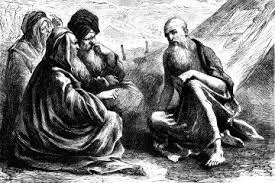Readings for the day: Job 25, 26, 27, 28
Three years ago, we built a home. Got to see it take shape from the ground up. Walked through it at every stage. Spent time going over all the details with the general contractor. Among the more significant was the insulation. How much? Where would it go? What was the rating? Insulation provides a protective barrier around the home. Keeps the utility bills low. Saves energy. Keeps the home comfortable.
As a Christian living in 21st America, I am “insulated” from so much that goes on in the world. My government is stable and has a history of peaceful transfers of power. My community is protected by faithful men and women who serve on the police force and in fire departments. I have access to the best medical care in the world. My household income places me in the top .06% of the world’s wealthiest people. As such, I can buy what I need when I need it. I live in a warm home in the winter, a cool home in the summer. My children go to great schools where they are taught by some of the best teachers around. College is not just a pipe dream but an expectation for them. Because of the color of my skin, I have never had to face racism either on a personal or systemic level. I have never been held back because of my gender. My sexual orientation places me in no danger. All these advantages create “layers of insulation” that have afforded me a pretty safe and comfortable, dare I say even idyllic, life.
They also create “cultural distance” between myself and those who have had a much different experience in life. This includes many of my African-American and Hispanic brothers and sisters. Many of my female colleagues in ministry. Many of my LGBTQ friends. It includes my brothers and sisters living in Ethiopia, South Sudan, Uganda, Djibouti, and Somalia. And it most certainly includes a man named Job who lived in the land of Uz during the time of the patriarchs of the Bible. One of the more difficult challenges when it comes to interpretation is recognizing the “cultural distance” between us and the men and women of Scripture. Job lived at a time when there was no democracy. No rule of law. No peaceful transitions of power. Job lived in an age where pain and suffering was common. There were no police, no firefighters, no first responders. Healthcare was non-existent. Disease, famine, pestilence, drought happened all too often. Job lived at a time where families and clans and tribes lived in an almost constant state of war. Women and children were raped and murdered. The wealthiest were often the most envied and most targeted. And there was no guarantees beyond what you could guard and protect through your own strength. As such, when we read about the Sabeans raiding and killing all of Job’s oxen and donkeys. When we read about a firestorm from heaven that kills all Job’s sheep and servants. When we read about the Chaldeans raiding his camels or hurricane force winds collapsing a home on Job’s children, we cannot imagine what that must feel like. Because we are largely insulated from such tragedies. But Job is not. His friends are not. They live in a world where these things happen with some degree of regularity.
And yet Job believes. He holds fast to his faith. The language he uses to describe God in chapter 26 is some of the most beautiful and stirring in all of Scripture. “Sheol is naked before God, and Abaddon has no covering. He stretches out the north over the void and hangs the earth on nothing...He has inscribed a circle on the face of the waters at the boundary between light and darkness...Behold, these are but the outskirts of his ways...” (Job 26:6-7, 10, 14) And I love how he describes his search for wisdom in chapter 28. “But where shall wisdom be found? And where is the place of understanding? Man does not know its worth, and it is not found in the land of the living. The deep says, 'It is not in me,' and the sea says, 'It is not with me.' It cannot be bought for gold, and silver cannot be weighed as its price...Gold and glass cannot equal it, nor can it be exchanged for jewels of fine gold...From where, then, does wisdom come? And where is the place of understanding?...Abaddon and Death say, 'We have heard a rumor of it with our ears.'” (Job 28: 12-15, 17, 22)
In the face of all Job has suffered, he still trusts in God. One of the great truths I have discovered as I travel and teach all over the world is that “insulation” is a faith-killer. The more layers, the more we struggle to believe. The more we have, the harder it is for us to trust in God. The more safe and comfortable we are, the less resilient our faith. The book of Job describes in vivid detail what happens when all the layers are peeled back. Everything we have is stripped away. All we hold dear is lost. In that moment, will we cling to faith? Will we walk the path of wisdom that God lays out for us? “God understands the way to wisdom, and he knows its place...And he said to man, 'Behold, the fear of the Lord, that is wisdom, and to turn away from evil is understanding.'” (Job 28:23, 28)
